| Special Talk |
President Xu of Peking University.
Behind him is the calligraphy by Mr. Guo Mo-ruo, the first president of the Chinese Academy of Sciences and a graduate of Kyushu University.
|
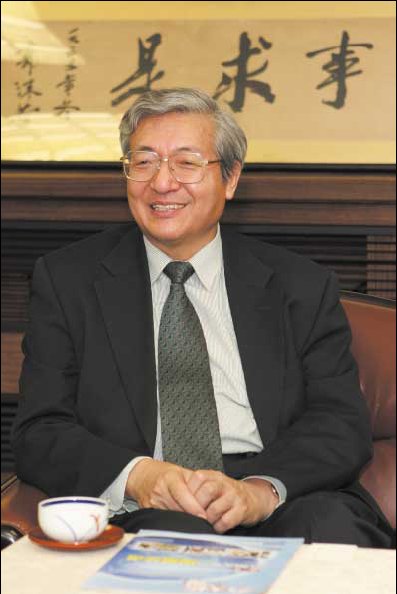
Xu Zhihong Born in 1942, Xu graduated from the Department of Biology of Peking University and from the Graduate School of the Shanghai Institute of Plant Physiology of the Chinese Academy of Sciences (CAS). His research focused on plant development biology. After serving as Vice President of the Shanghai Institute of Plant Physiology, CAS, and as Invited Professor at the National University of Singapore, he became the President of Peking University in 1992. In the same year, he was also appointed as the Vice President of the Chinese Academy of Sciences. |
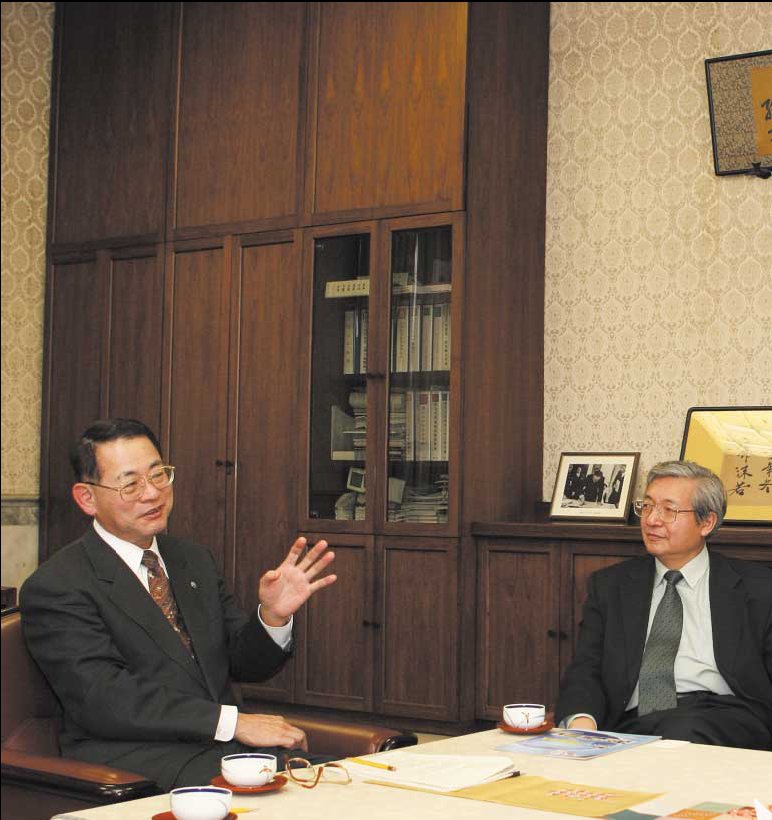 |
| In president's office. From left: President Kajiyama of Kyushu University, President Xu of Peking University, and Trustee Yanagihara (Vice President) of Kyushu University. The writing on the wall is said to be written by Sun Yat-sen, the Father of China, upon his visit to Kyushu University in 1913. |
In late March, Xu Zhihong, President of Peking University, paid his first visit to Fukuoka to attend the commencement of the Graduate Schools of Kyushu University as a guest of honor. In honor of his visit, there was a talk session between President Xu and Tisato Kajiyama, President of Kyushu University. Their vigorous discussion centered on education and research and the establishment of a network among Asian universities.
In particular, President Xu emphasized the importance of expanding opportunities for higher education abroad in order to foster human resources that can support China, which has developed into a global factory and a global market. Through their enthusiastic discussion, they reaffirmed that human exchanges among students and faculty of both universities are indispensable for world peace and long-term economic development. After their talk, an academic exchange agreement was signed, making a new start toward the enhancement of exchanges between both universities.
What is the source of Chinese students' "eager spirits"?
Yanagihara: First, I would like to ask you about your view on human resources development. At Peking University, what kind of human resources are you trying to raise, and through what kind of education?
Xu: Currently, presidents of universities in China have a great interest in the development of human resources, and they give serious thought as to how they can raise valuable personnel for China and for the world in the 21st century.
Yanagihara: About a month ago, when our president Kajiyama had a talk with the 2004 Nobel Prize winner in Chemistry, Dr. Aaron Ciechanover from Israel, the discussion included how actively and powerfully Chinese students are making exceptional contributions to the world. Where does such an eager spirit that the Chinese students display come from?
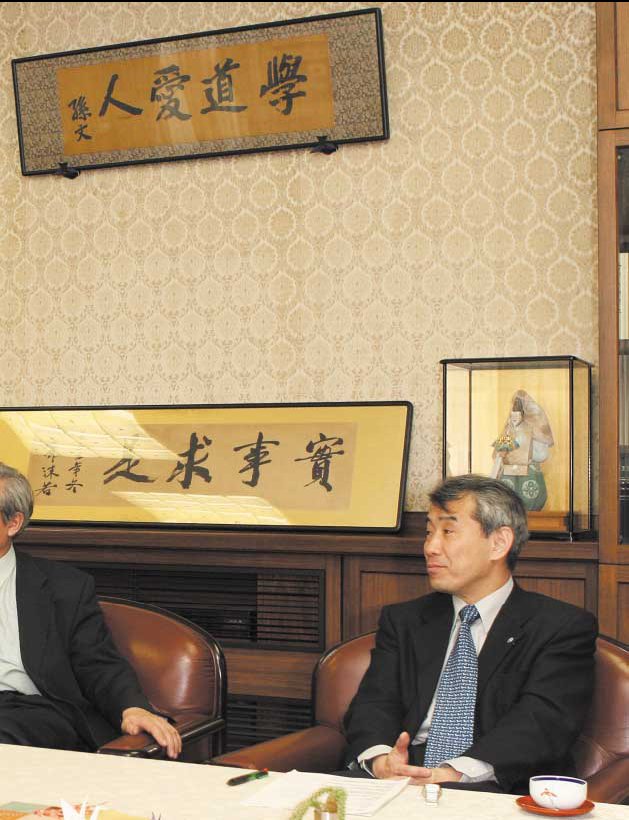 Xu: I believe that in China parents are dedicated to their children's education, which can commonly be seen in countries throughout East Asia, including Japan, China, and South Korea. Such parents' keen interest in education could be the source of Asian people's eager spirits.
Xu: I believe that in China parents are dedicated to their children's education, which can commonly be seen in countries throughout East Asia, including Japan, China, and South Korea. Such parents' keen interest in education could be the source of Asian people's eager spirits.
However, in China getting acceptance to Chinese universities is quite competitive. While about 15 million students take the national college entrance exam every year, there are only 30 national or provincial universities officially approved by the Ministry of Education. Each university accepts about 5,000 new students on average, so only 150,000 (30 x 5,000) students, that is, one out of every 100 students who take the national college entrance exam can get a ticket to higher education. Under such competitive circumstances, to enter top-notch schools such as Peking University or Tsing Hua University, students will have to win out at extremely tough competition.
We have had criticisms from our society that outstanding students are all gathered at national universities like Peking University based only on their academic performance in the exam. But there is no other effective method to select students other than this national college entrance exam.
Yanagihara: In Japan, as we are facing problems with an aging population and low birth rate; we are concerned about "the year 2007 problem," when the number of university applicants is expected to become equal to the number of students that will be accepted by universities.
Kajiyama: The problem here is if we try to maintain the quality of students, quite a few universities might go out of business. But if we look from the other side, universities are placed in a position to think about their quality in providing education.
One of the education programs that Kyushu University has been putting efforts into is an internship program. Considering the importance of learning the society as well as studying academic subjects at university, we send our students to some companies to experience working in business while they are still in school.
Another thing we would like to emphasize is an education program where students themselves raise questions and solve them, or where students can work on self-development. Such activities have been lacking in the conventional national universities in Japan, so we would like to focus our efforts to incorporate such programs into our curriculum.
Also, since we need to increase the number of people who study at universities other than full-time students, we are promoting lifetime learning to bring back working people to universities, and planning to establish a professional graduate school, such as a business school and a law school. We are also working hard to accept more foreign students, including students from China.
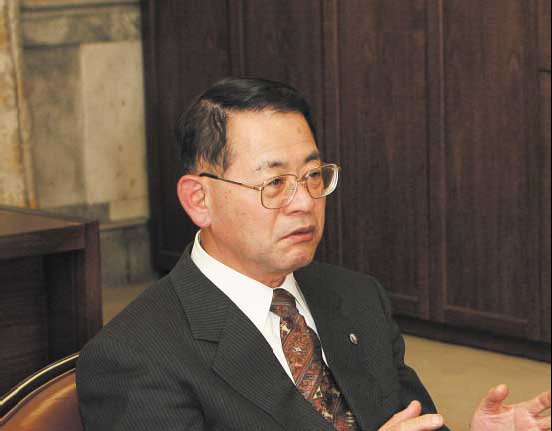 |
| President Kajiyama of Kyushu University |
What I always stress when talking to my students is that they should be able to take a broad perspective, regardless of where they work, within China or outside China. It is important that, while being in China, they acquire an ability to take a look at domestic issues from an objective standpoint, and also to take a look at foreign affairs subjectively from a broad, international standpoint.
No matter which nation we belong to, or no matter who we are, we cannot live completely isolated from the surrounding society or world. To create a peaceful world, I want young generations to learn more about foreign countries. Therefore, I feel such a great responsibility for the future, as a president of a university, since our current approach to international exchange will directly affect the future society.
Kajiyama: What is important is people should create opportunities to learn about different cultures or what's going on in other countries while they are young.
Rich experience will help them make a better choice when they need to make an important decision in their life, and that will lead them to the best in life. I also believe that conflicts or misunderstandings that concern people now might have been prevented if we had better understood the cultures or circumstances of other countries. In this regard, it is extremely important for young people to experience different cultures.
Serving as a hub university for business-academia collaboration
Yanagihara: Now I would like to ask you about business-academia collaboration. I have heard that many Chinese universities have established venture industries or listed companies.
Xu: First, I should explain why universities need such venture industries or listed companies. One of the reasons is the business structure in China, which is different from that in Japan. In Japan, each company's own research institute is responsible for turning the university's research results into products. However, in China, there is no such close tie between outside companies and universities. So, university researchers have to develop their own businesses in China.
Another reason is that universities in China don't have a strong financial base, so universities have to make money on their own.
Kajiyama: How many businesses does Peking University have?
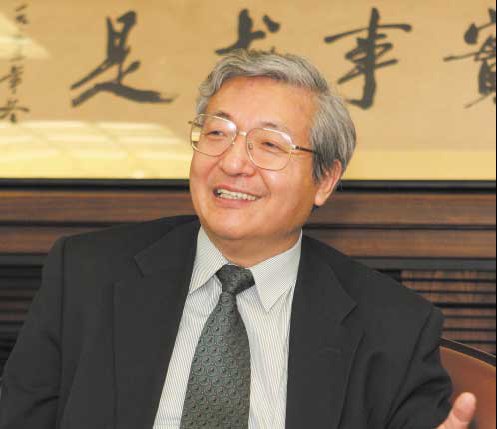 |
| President Xu of Peking University |
Recently, problems began to surface as those companies shift the blame of losses to universities, so the government is now trying to cut the direct tie between these businesses and universities. There have not been many successful cases so far, but some university businesses have seen the greatest of success. For example, Peking University Founder Group started business using their laser typesetting technology. This company revolutionized the conventional typesetting technology for Chinese character keys on personal computers, getting the technology into widespread use in countries where the use of Chinese characters is predominant, including Japan, South Korea, Singapore, and other South East Asian countries.
Another form of business-academia collaboration is collaboration between universities and local governments. For example, Peking University and Hong Kong University of Science and Technology developed a business-academia center in Shenzhen in collaboration with the Shenzhen government. The center has been used as an incubation center of academia-business research results.
Kajiyama: I noticed that what you have been telling me about your university sounds quite different from what I had been thinking about your university. I thought that China's two topnotch universities divide their roles, with Peking University placing an emphasis on humanities and fundamental studies, and Tsing Hua University on applied studies including venture businesses. I didn't know that Peking University was so keenly involved in business-academia collaboration.
Xu: We certainly put an emphasis on fundamental studies. However, since the Founder Group's businesses are based on fundamental sciences, we cannot say that Peking University handles only fundamental studies and Tsing Hua University handles only applied studies. In other words, humanities and sciences cannot exist without each other.
Kajiyama: Since Kyushu University is one of the hub universities in Japan, we basically focus on human resource development and fundamental studies. However, I believe that real fundamental studies will surely be developed into applied studies.
I learned this from my experience and also that's what I firmly believe. This year we will open a new campus in the western part of Fukuoka City. In the surrounding area, we are preparing to build an academic research city called the Science Park to actively develop our theme researches such as the system LSI, nanotechnologies, and technologies using future energy, hydrogen. Our basic policy for business-academia collaboration seems very similar to that of Peking University, as I believe that we both feel responsible for serving as a hub university. So, I truly hope to deepen our relationship in terms not only of education but also of academia-business collaboration.
Now is the time to develop an Asian Standard
Yanagihara: Let me ask you about today's last issue, creating a network in Asia. To establish a pole in Asia apart from Europe and America, Kyushu University has been working on the development of many things, including educational collaborations. For example, we hosted the Conference of Asian University Presidents, and set up branch offices to promote the development of an Asian network. We were pleased to have the president of Peking University over to this conference. Could you tell me your outlook on the creation of such a network of Asian universities?
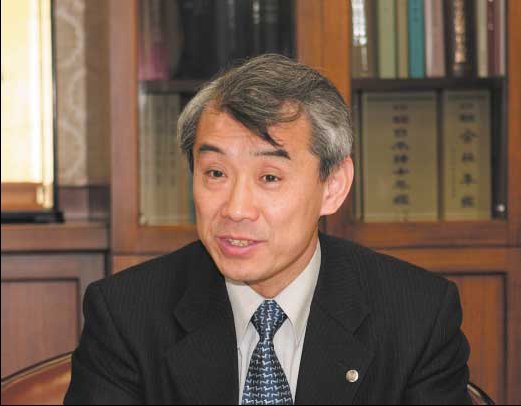 |
| Trustee Yanagihara (Vice President) of Kyushu University |
Kajiyama: I would like to suggest another important thing other than what President Xu just mentioned as to creating the network of Asian universities. Looking from the standpoints of education, politics, and many other aspects, the world is now operating at three individual
poles: Europe, America, and Asia. However, if we think about the situation of education; let's say, if we want our students to get some credentials, we notice our current system relies heavily on American or European standards. For example, for recognition of qualified engineering programs, ABET, which is an accreditation program in the US, is the only available program. However, as Asian people, we have different culture and religion. So, we should establish our own "Asian Standard." It is the right time for Asian university presidents to get together in a university in Asia, and begin developing a curriculum for quality assurance for education and credential programs.
Therefore, I believe Asian hub universities need to make more collaborative efforts than ever to construct a firm network.
Yanagihara: In conclusion, could you give a message to students and young researchers in Kyushu University?
Xu: What is essential for the future of Asia is that young people deepen mutual understanding. I hope that the young generation in Asian countries will cooperate with each other to contribute to the development of the future of Asia, and to the development of the future of Japan and China.
Kajiyama: Thank you very much for sharing time with us, even though you must be tired right after arriving in Fukuoka. We appreciate hearing your view regarding expanding exchange opportunities between Peking University and Kyushu University. We are also hoping to make our relationship into a form that is even more tangible than providing opportunities of interaction for students or faculty members. Thank you very much again.
Previous PageTop Next
